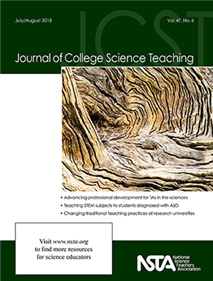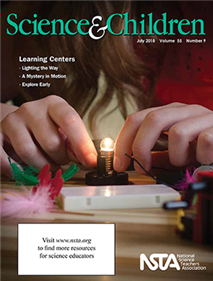All Resources
Journal Article
Changing the Teaching Culture in Introductory STEM Courses at a Large Research University
The authors describe a major transformation in teaching large introductory courses in the sciences and engineering at the University of Illinois at Urbana-Champaign, impacting over 17,000 students yearly. The transformation was emergent, not prescrib...
Journal Article
This column shares reflections or thoughtful opinions on issues of broad interest to the community. In this issue the authors describe how they discovered that by incorporating culturally relevant analogies and examples into our classrooms, it was p...
Journal Article
Case Study: Hands-On Mini-Case Studies Promote Integration of Microbiological Concepts
This column provides original articles on innovations in case study teaching, assessment of the method, as well as case studies with teaching notes. In this article, the authors present a series of 10 mini-case studies that have been incorporated int...
Journal Article
Graduate teaching assistants play an important role in undergraduate programs in the authors' Earth Science Department. A course on teaching and learning was developed to train graduate students in student-centered pedagogy, in a discipline-specific ...
Journal Article
The Five Minute Teach (5MT) serves as both a training tool for graduate teaching assistants (TAs) and a format for explicit discipline-based writing instruction. Here the authors describe the development and execution of the 5MT as part of a profess...
Journal Article
Research and Teaching: Enriching Undergraduate Experiences With Outreach in School STEM Clubs
The STEM Club Leadership for Undergraduate STEM Education, Recruiting and Success project at a large public research university in the Mountain West presents an outreach model to engage undergraduate STEM majors in developing and facilitating activi...
Journal Article
Research and Teaching: Observable Features of Active Science Education Practices
Although research findings support elevated learning outcomes for students who engage in active science learning, faculty members are still resistant to using these practices. In this article the authors describe the observable features found in 17 ...
Journal Article
Support scientific development among young children with learning centers....
Journal Article
Lighting the Way to Learning Centers
Fourth-grade students explore circuits, while the teacher gains valuable instructional time....
Journal Article
Exploring the concept of living and nonliving with second-grade students...
Journal Article
Renovating Our Science Learning Centers
Informal learning centers transcend disciplinary boundaries as students address real-world applications....
Journal Article
Editor’s Note: My Last Editor’s Note
Science and Children’s editor shares thoughts regarding the current issue....
Journal Article
Teaching Through Trade Books: Star Light, Star Bright
This column includes activities inspired by children’s literature. This issue discusses how younger students can learn about patterns through constellations, which have set times at which they appear in the night sky. As students get older, they ca...
Journal Article
This column focuses on promoting learning through assessment. This issue discusses learning station probes....
Journal Article
The Poetry of Science: Force, Motion, and Energy
Building literacy in playful, meaningful ways. The poem in this month's article shows us everyday uses of energy, force, and motion....
Journal Article
Science 101: How Do We Best Teach and Learn Science Concepts?
This column provides background science information for elementary teachers. In this issue the author discusses the method he uses to explain a science concept or concepts....
Journal Article
STEM-ify Me: It’s Elementary! Designing Butterfly Wings
By Augusto Macalalag Jr., Barbara Johnson, and Joseph Johnson
Journal Article
Breathing New Life Into Elementary Science Preservice Teacher Education
By Taylor J. Mach and Mandy M. Mach




